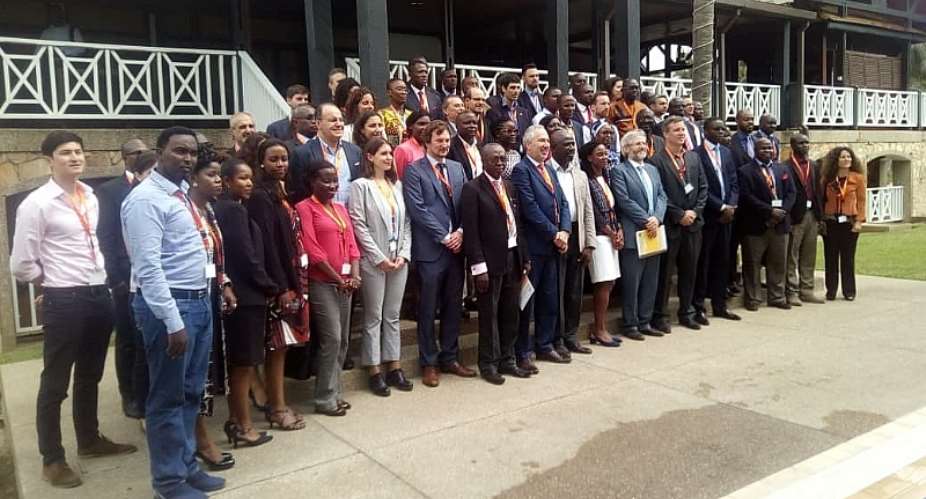Remittances to Sub-Saharan Africa increased by over 11percent from US$34 billion in 2016 to US$38billion in 2017, the International Organization for Migration (IOM) has said.
The IOM says the 11percent increment is expected to continue through 2019 with an additional US$4billion estimated to end the year at US$42billion.
The challenge, according to IOM is that, Sub-Saharan Africa remains the most expensive place in the world to send money with an average cost of 9.4 percent of the transfer amount, a figure that was 29 percent above the world average in 2017.
This is far short of the Sustainable Development Goals (SDGs) target 10.C.3 to reduce the transaction costs of migrant remittances to less than 3 percent by 2030, says IOM.
It is against this background that a 3day workshop has been held for 80 participants involved in IOM’s “ACP-EU Migration Action", including migration experts and representatives from African, Caribbean and Pacific (ACP) governments, regional organizations, the European Union (EU), UN agencies and NGOs working in remittances and diaspora mobilization.
The meeting which is organized by IOM’s country office for Ghana and the IOM Regional Office in Brussels in partnership with the African Institute for Remittances (AIR) and Making Finance Work for Africa Partnership (MFW4A) aim to generate thematic recommendations for the Sub-Saharan region and establish links between the outcomes of the ACP-EU Migration Action programme, and processes relevant to the ACP-EU Dialogue on Migration and Development at the regional and global levels.
Speaking to ModernGhana at the sidelines of the opening ceremony in Accra, Country Manager of International Organization for Migration (IOM) in Ghana, Sylvia Lopez-Ekra said the high cost of remittances has compelled migrants to resort to informal channels mostly associated with several risk factors.
She noted that access to formal remittance services by rural communities is another challenge which deprives dependents the full benefit of the remittances that has become a source of livelihood for many homes.
Mrs. Lopez-Ekra added that migrants must also be informed about the transfer corridor and the available options that are cheaper in terms of transaction cost.
According to her, there must be a conscious effort to improve access to domestic payments infrastructure at both the send and receive ends to facilitate smooth transfers.
Mrs Lopez-Ekra expresses worry about the limited access to information and education by the local folks on the productive use of remittances.
According to her, chunk of the remittances are spent on consumption by the receiving households.
She said this approach does not engender growth and development indicating that the recipients and communities need to be educated on how to maximize a lot more from the remittances by channeling them into investment opportunities.
Mrs Lopez-Ekra indicated that remittances can be used as a means to bridge the gap between the banked and the unbanked and promote financial inclusion.
“The families are receiving remittances and what are we telling them about what they could do in terms of savings and investments. That is why we have seconded one of our consultants, ACP EU Migration Action to the diaspora affairs office in Ghana so that we can be looking at better products that transfer money operators under banks can offer to the population to make sure that when you sending remittances you can link them up with health insurance, capital for businesses and education plans,” she stressed.
The Director of Diaspora Affairs Office at the Office of the President, Mr Akwasi Awua Ababio said government is taking concrete steps to build strong relations with neighbouring countries through the ECOWAS medium to streamline the activities of service providers to reduce the transaction cost.
He posited that Government is considering the option of bringing together the market forces that are dictating the pace particularly the registered service providers to discuss possible ways to reduce the cost of remittances.
Mr Ababio intimated that the volume of remittances in Ghana is about Ghc3billion in 2018 which is largely above what the country receives as aid from donors.






 We’ll no longer tolerate your empty, unwarranted attacks – TUC blasts Prof Adei
We’ll no longer tolerate your empty, unwarranted attacks – TUC blasts Prof Adei
 Bawumia donates GHc200,000 to support Madina fire victims
Bawumia donates GHc200,000 to support Madina fire victims
 IMF to disburse US$360million third tranche to Ghana without creditors MoU
IMF to disburse US$360million third tranche to Ghana without creditors MoU
 Truck owner share insights into train collision incident
Truck owner share insights into train collision incident
 Paramount chief of Bassare Traditional Area passes on
Paramount chief of Bassare Traditional Area passes on
 Two teachers in court over alleged illegal possession of BECE papers
Two teachers in court over alleged illegal possession of BECE papers
 Sunyani: Victim allegedly shot by traditional warriors appeals for justice
Sunyani: Victim allegedly shot by traditional warriors appeals for justice
 Mahama vows to scrap teacher licensure exams, review Free SHS policy
Mahama vows to scrap teacher licensure exams, review Free SHS policy
 Government will replace burnt Madina shops with a new three-story, 120-store fac...
Government will replace burnt Madina shops with a new three-story, 120-store fac...
